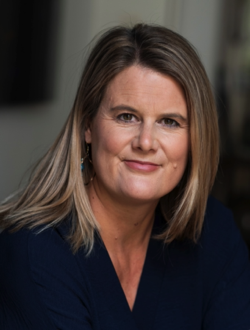Dr. Alice Jill Edwards
Special Rapporteur on torture and other cruel, inhuman or degrading treatment or punishment

Dr. Alice Jill Edwards (Australia) is the seventh – and first woman – UN Special Rapporteur on Torture and Other Cruel, Inhuman or Degrading Treatment or Punishment appointed by the UN Human Rights Council. Her appointment was announced on 8 July 2022 and her tenure begins on 1 August. A highly skilled lawyer, scholar and negotiator, Dr. Edwards has an established record of sustained engagement on behalf of victims of human rights violations and of critical contributions to the development of standards in international law.
An advisor to governments, international and regional bodies, national institutions and civil society, Dr. Edwards understands the challenges, obstacles and opportunities for reform, and engages in respectful and courteous dialogue. Over a career spanning 25 years she has worked with a wide range of stakeholders to improve outcomes in the fields of criminal justice; police and law enforcement; military and security services; immigration, asylum, statelessness and human trafficking matters; discrimination law; and prison and correctional standards.
Most recently, Dr. Edwards was Head of the Secretariat of the Convention against Torture Initiative (CTI), a unique inter-governmental collaboration to achieve universal ratification and implementation of the UN Convention against Torture and Other Cruel, Inhuman or Degrading Treatment or Punishment (UNCAT) (2016-21). During her tenure, 15 new States joined the Convention and started their implementation journeys, far surpassing the ratification rates of most other human rights treaties, while over 180 States participated in capacity building activities and diplomatic visits.
Previously, she was Chief of Section – Protection Policy and Legal Advice at the Office of the United Nations High Commissioner for Refugees (UNHCR) in Geneva (2010-15), a key institutional position, following field assignments in Bosnia and Herzegovina, Rwanda and Morocco.
Among Dr. Edwards’ most renowned work is her breakthrough legal argument, which is now accepted as doctrine globally, that rape and sexual violence are forms of torture and persecution, enabling hundreds of thousands of victims to claim protection under the 1951 Convention relating to the Status of Refugees. Additionally, her efforts in Bosnia and Herzegovina in the late 1990s to secure appropriate long-term post-war solutions for female victims of war violence and their families have been adopted as UN operational practice and State policies. Significant portions of her fieldwork informed her influential book, Violence against Women under International Human Rights Law (Cambridge University Press, 2011), for which she was awarded the Audre Rapoport Prize for Scholarship on the Human Rights of Women.
Dr. Edwards’ published empirical case studies into alternatives to administrative detention, and her legal arguments on the application of the UN Optional Protocol to the Convention against Torture (OPCAT) to immigration and refugee detention centers, have been utilized widely by the UN and international organizations, governments, courts and civil society. Her work to conceptualize and steer UNHCR’s multi-year Global Strategy – Beyond Detention, has been described as a “blueprint for human rights advocacy”. She is the author inter alia of UNHCR’s detention guidelines and the agency’s first guidelines on gender-related persecution; author of the background paper underpinning CEDAW General Recommendation No. 32; and has been on advisory committees for the revision of the Istanbul Protocol on the investigation and documentation of torture and the Mendez Principles on Effective Interviewing for Investigations and Evidence Gathering.
Counting over 50 publications and reports, Dr. Edwards’ principal authored and co-edited books are: Human Security and Non-Citizens: Law, Policy and International Affairs (2010), Violence against Women under International Human Rights Law (2011), Nationality and Statelessness in International Law (2014), and In Flight from Conflict and Violence: UNHCR’s Consultations on Refugee Status and Other Forms of International Protection (2017).
Dr. Edwards is a board member of leading academic journals including the open-source Torture Journal and has held permanent and adjunct academic appointments at world-leading universities including Oxford, London and Nottingham. Currently, she is an adjunct faculty member at Oxford University’s Master of Studies in International Human Rights Law.
In the early days of her International Relations career, she worked for Amnesty International and a development NGO in Mozambique.
Dr. Edwards speaks English, French and intermediate Portuguese.
Dr. Edwards is an Australian-qualified barrister and solicitor. She holds a PhD in Public International Law from the Australian National University; a Master of Laws in Public International Law awarded with Distinction from the University of Nottingham in the United Kingdom of Great Britain and Northern Ireland; a Diploma in International and Comparative Law from the René Cassin International Institute for Human Rights in France; and a Bachelor of Laws (with Honours) and Arts from the University of Tasmania in Australia.
Dr. Edwards’ Special Rapporteurship will capitalize on the benefits of cooperation and constructive conversation, and sharing concrete and pragmatic advice in line with international law and best practice. The key to sustained and long-term change is in the hands of leaders at all levels, who need to be involved in identifying the problem and being part of the solution. She will put the rights of survivors and their families centre-stage, including their right to speak and to be heard, to participate in decisions affecting them, to rehabilitation, and to a remedy. Attention will be given to tackling the causes, prevention and accountability for inhumane and abusive practices, applying feminist and equality-centered methods and perspectives. Representation and community involvement will be important themes of her rapporteurship. Detailed information on Dr. Edwards’ approach, and thematic areas of focus will be outlined in her first report.